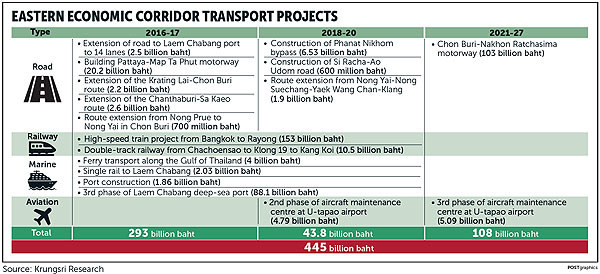
The government's flagship policy to promote the Eastern Economic Corridor (EEC) is expected to help accelerate investment in three targeted industries over the next 3-5 years, helping businesses in the region grow from 2018, according to Krungsri Research, a unit of Bank of Ayudhya.

The study showed that the targeted industries that would benefit from the EEC are the logistics sector, the energy and bio-chemical sectors and the tourism sector.
Other related areas including the retail sector, real estate and construction are expected to enjoy growth.
The government has passed a new law governing infrastructure construction and management of the EEC, which is expected to be implemented next year, when massive government outlays and investment in megaprojects are due to start.
"That includes a 400-billion baht budget to invest in developing transportation facilities in order to cut the country's logistics costs from around 14% of gross domestic product (GDP), which is recognised as being higher than most other Asean countries," the study said.
The plan includes a project to develop industrial estates on a 70,000 rai land plot by the Industrial Estate Authority of Thailand (IEAT), on top of a plan to give more investment privileges from the Board of Investment.
"Those positive factors would help benefit investment in the eastern area in the long term," according to the study.
Huge investment in transportation and logistics facilities is expected to attract large sums of money, fostering new-generation industries with higher technology and innovation in the region, in line with the government's policy to lead the country to the "Thailand 4.0" era.
Krungsri Research projects promotion of the EEC will spur massive investment in three major major sectors that are expected to start growing sharply over the next 3-5 years, which would help drive the gross regional product (GRP) of the country's eastern region to grow by 1.0%-1.5% per year.
The forecast is based on the expectation that the country's GDP will grow around 5% a year.
The sector that is expected to benefit most from the EEC is the logistics sector, especially third-party logistic service providers and companies that provide modern warehouses in the area.
The EEC project also creates a transportation shortcut between the Pacific Ocean and the Indian Ocean, which will provide a long-term boost to the logistics sector, especially after the development of the Dawei project in Myanmar.
The EEC is also expected to help support and attract more investment in energy and bio-chemical businesses.
That would be in line with the government's policy to promote Thailand to become the regional "bio-economy" hub, an area where the country is well-positioned due to its plentiful bio-sources such as rice, tapioca and rubber, which can be used to produce renewable energy and bio-chemical products.
Another business that is expected to benefit from the EEC is tourism. The plan to modernise U-Tapao airport, in line with the policy to promote the EEC, is expected to encourage foreign tourists to fly directly to Pattaya and other famous tourist destinations in the eastern region.
There are also other government projects aimed at developing new rail routes and seaports that are expected to help facilitate transportation to the region. Those plans would particularly foster greater travel among Thai citizens.
Krungsri Research further forecasts that real estate developers, retail businesses and construction companies will benefit from development of the EEC, as greater numbers of people will spur the need for more accommodation while also driving both consumption and competition.